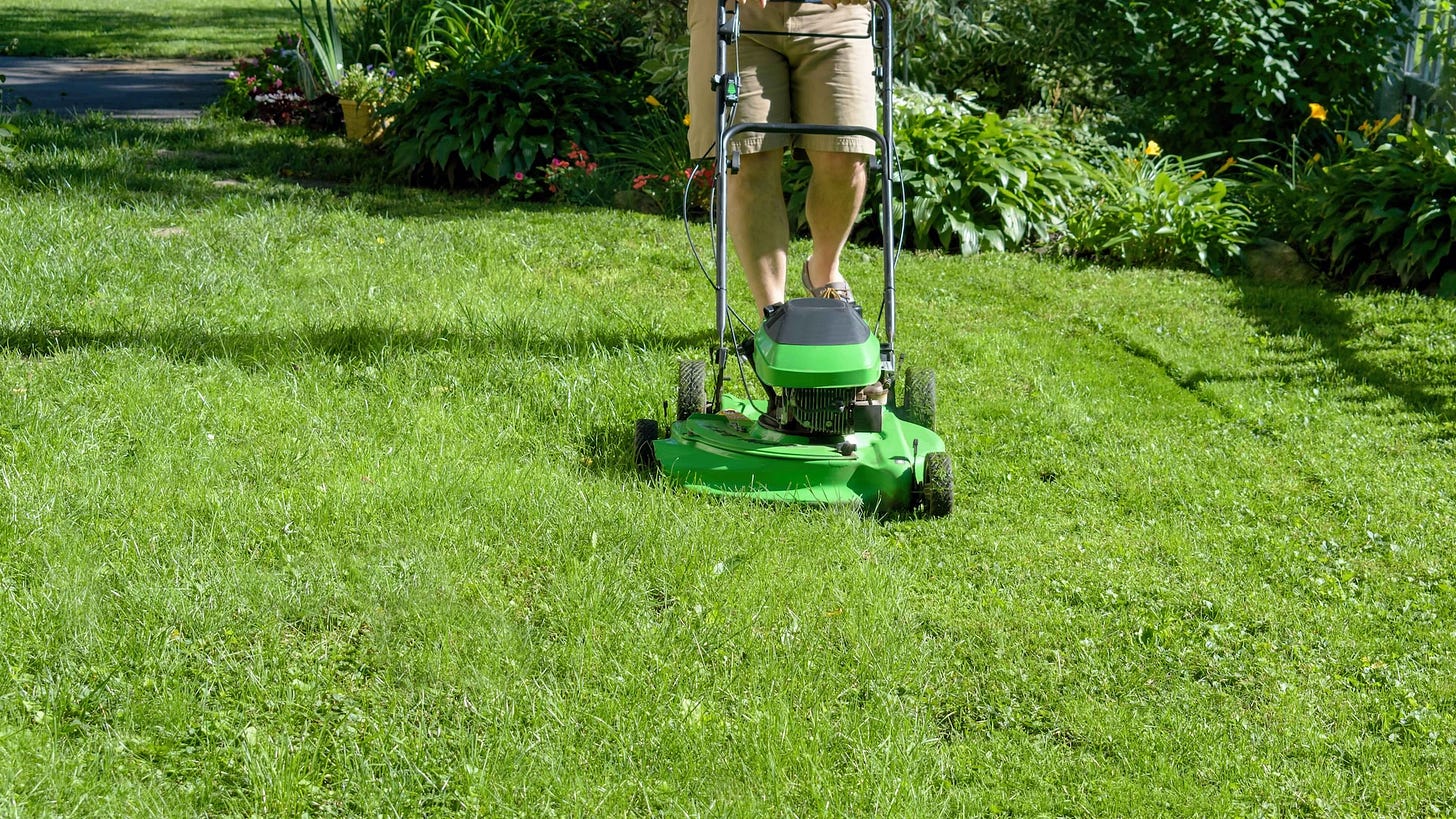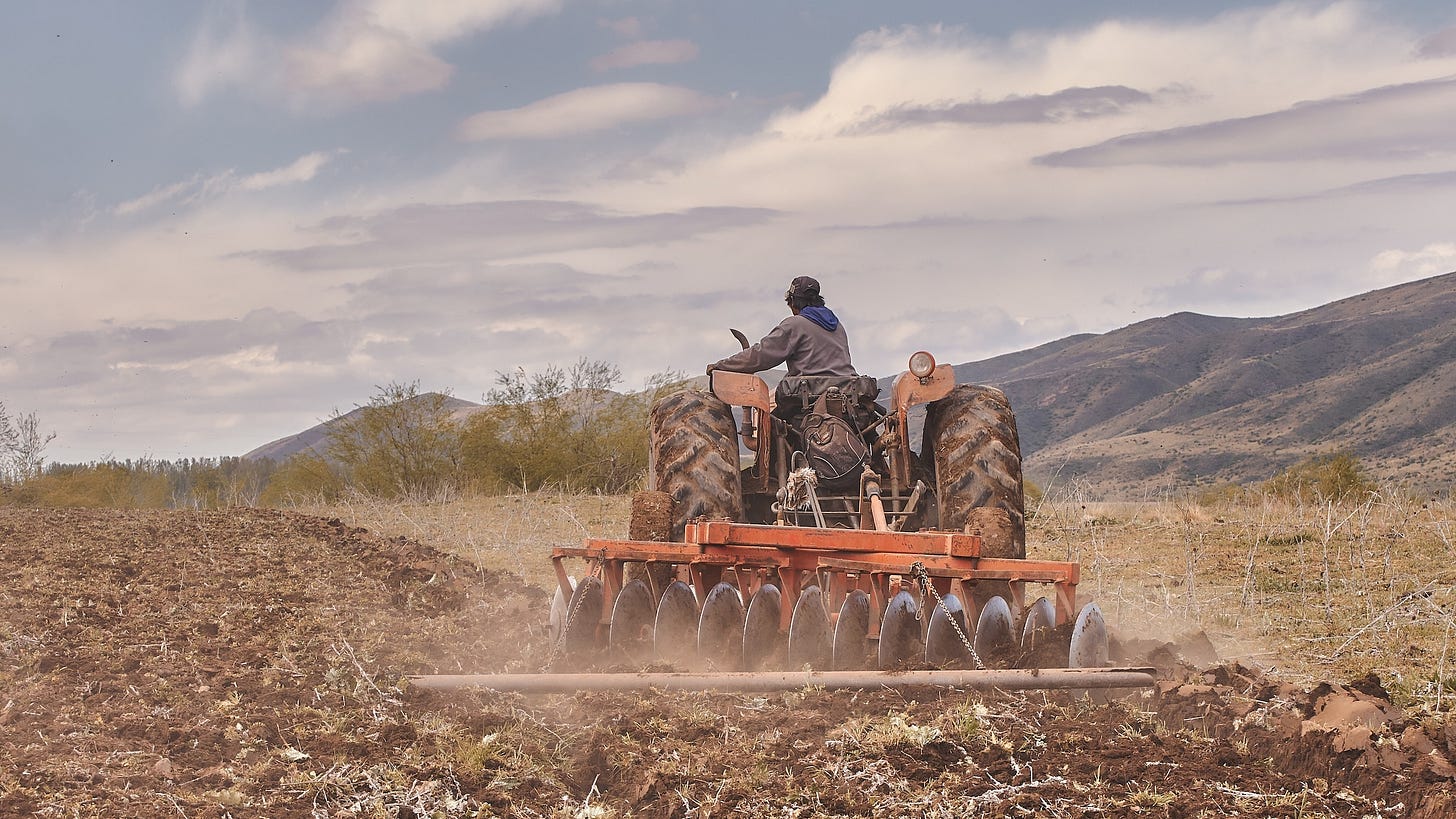What Cleaning Toilets, Mowing Lawns, and Driving Tractors Taught Me About Life
And why I still think about them today
It’s surprising what jobs you’ll agree to do as a teenager - jobs you probably won’t consider doing later in life. At that age, the job is rarely the dream.
It’s a means to an end. It’s just a job. A way to make money to support your immediate interests or needs. So you can buy (in my case a thousand years ago) that stereo. Or perhaps a car. Then put gas in the car, pay insurance, maintenance, etc.
What was unexpected about those early jobs is they gave me something else entirely: they gave me a framework for life.
Not in a grand, philosophical way. But in a practical way that sticks with you and subtly shapes how you work, how you lead, how you see the world.
I didn’t get it at the time, but I realize I’ve used that framework throughout adulthood. It’s surprising, really.
The Janitor Job: Invisible Work Matters
I was a young teen when I learned how to run an orbital floor polisher. I also mopped floors and cleaned toilets.
The irony of this, upon reflection, must have driven my mother crazy as I did not, shall we say, keep my bedroom overly tidy, and yet here I was working as a janitor keeping someone else’s space spotless.
The job was straightforward: keep the building - a church - clean. Really clean. Floors, bathrooms, the sanctuary, classrooms, trash bins. The usual suspects.
The aha moment doing this job was that no one notices when a place is clean. Only when it’s not.
When was the last time you walked into a church that was dirty? Exactly.
I would spend hours getting the floors to shine - sweeping, mopping, waxing, polishing - and not a single person would say a word. But miss a spot, and someone would comment.
That was a wake-up call about appreciation, or lack thereof. But I learned that invisible work is still important. Just because no one says anything doesn’t mean it’s not making a difference.
My boss, Margaret, instilled in me that good enough wasn’t good enough. The job wasn’t done until I knew I had done it well. Period. And that instilled in me that personal satisfaction doing a good job was important.
Cleaning toilets, by the way, is a humbling and an oddly satisfying task. It taught me dignity in all forms of labor. No job is beneath you if you do it with integrity.
The Lawn Mowing Gig: Clients, Costs, and Dangers You Don’t See Coming
If janitorial work taught me pride in invisible effort, lawn mowing taught me how visible - and subjective - feedback can be.
I developed a roster of regular clients on a schedule. Most customers were happy with my work. Some were even generous when it came to benefits like an iced tea. Or the occasional tip.
Some, though, were impossible to please.
I’d finish a perfect mow, with lines sharp enough for a golf course and clippings collected, and they’d say, “Please redo that back corner.” Which I would under their scrutiny, still unconvinced I had done it properly. Which I had.
I learned every customer is different. What thrills one disappoints another. And that it’s not always about the quality of my work. Sometimes it’s about them, their mood, their expectations, or something else entirely that has nothing directly to do with me.
The hardest part of that lesson was learning how to set my ego aside. Learning what mattered was whether the customer was satisfied or not. As a teenager, I can’t say I was always successful taking the emotion out of it from my side. Learning empathy wasn’t easy at that age, but the foundation for it was laid.
I also learned to pay attention to the numbers. Gas was the main expense. Maintenance added up. If I underpriced a job, I was the one paying for it - literally. As a young kid, it was difficult standing up for myself asking for more money when the lawn was larger than average. I didn’t necessarily appreciate my strong suit of being reliable, honest, and always doing my best. I did learn, even then, if priced fairly, people would pay for quality work. My work.
It was also my first lesson in managing a P&L.
And then there were the hidden obstacles - an unexpected pile of dog poo that would turn my mower wheels into a disgusting mess or a piece of pipe poking up just below the grassline that would totally wreck my mower blade. While they weren’t always present, the threat of them taught me to anticipate problems and be diligent when I was working.
My lawn mowing experience still influences how I manage projects. Scope it. Price it. Watch your numbers. Expect feedback that isn’t always a reflection of your work. And always check for hidden hazards before you start.
The Tractor Seat: Where Thinking and Focus Collide
I grew up in a farming community. There were always farmers looking to pick up some extra labor for certain lower level tasks.
Driving a tractor was one of these tasks. It wasn’t glamorous and it wasn’t complex. You were out there in the fields with hours of discing or harrowing to do. Day after day for an entire season.
At first, it felt mindless. It was hard to comprehend I was going to spend the next 10 hours - my entire day - going back and forth in this one field. That one field was all I was going to accomplish today.
But soon I realized the gift of that repetition and time - it gave me time and space to think.
There’s a kind of clarity that comes from doing one thing with your body while your mind is free to roam. I loved solving problems on that tractor I didn’t even know I had. World problems, even. I daydreamed. I planned. I let thoughts unspool at their own pace.
But that calm was always balanced with a warning: this is still a dangerous machine that has no conscience.
One lapse in attention, and I could take out a fence line. Or roll the tractor. It would not end well for the tractor - or me.
It also taught me focus. The kind where you stay on task even when it feels like nothing’s happening.
That focus has stayed with me. In endless corporate meetings. In creative work. In the middle of a long project (budgeting, anyone?) when it feels like I’m just slogging through the same thing over and over.
It’s not always supposed to be exciting. Sometimes, staying focused is the job.
The Threads to Today
When I think back to these first jobs, I don’t just remember the work. I remember how they made me feel - capable, independent, proud.
They didn’t give me big titles or fat paychecks. But they gave me something better:
A respect for every job and every worker.
An early understanding of what it means to serve others - even when they don’t see it.
A real sense of ownership and responsibility.
An unexpected lesson in what the customer experience is all about.
And maybe, most importantly, they showed me that even the most ordinary work can be done with care, integrity, and pride. That showing up and doing the task at hand, whatever it is, has value.
That all work, whatever it is, is honorable.
I Still Catch Myself…
…checking how clean the floor and restroom is in a store or restaurant.
…thanking the person cleaning the restroom at the supermarket.
…noticing how the lawn crew trims the lawn of my complex.
…appreciating the value of taking time and making space to just think.
We like to think life’s key lessons come wrapped in diplomas, promotions, or sudden flashes of insight. But often, they come from the seemingly mundane things - a sticky floor, a shaggy lawn, or the view from a tractor seat.
Those first jobs weren’t the dream but they gave me the foundation to build one.
P.S. If you had a first job that shaped how you see the world, I’d love to hear it. What lessons stuck with you?
These posts show up kind of like a surprise snack: not every day, but always welcome. Want in? Hit Subscribe.
👉 If this post sparked something for you, share it with a friend or hit the ❤️ so it reaches more awesome people like you. 🙏






